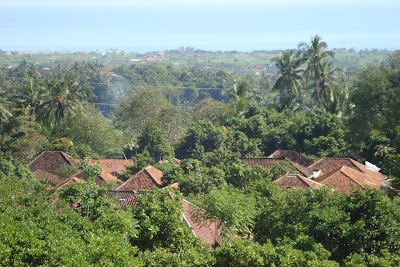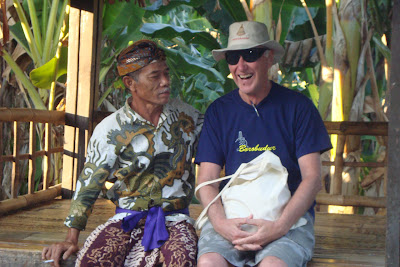
There are all sorts of expats in Bali, hiding out in this shifting community of the planet's "homeless and assetless", languidly killing time like characters in a Graham Greene novel. They are Westerners who have been so ill-treated and badly wounded by life that they've stopped the whole struggle and decided to camp out in Bali indefinitely, where they can live in a gorgeous house for $200 a month, perhaps taking a young Balinese man or woman as a companion, where they can drink before noon without getting any static about it, where they can make a bit of money exporting a bit of furniture for somebody. But generally, all they are doing is seeing to it that nothing serious will ever be asked of them again. These are not bums, mind you. This is a very high grade of people, multinational, talented and clever. Everyone used to be something once (generally "married" or "employed"); now they are all united by the absence of the one thing they seem to have surrendered completely and forever: ambition. To quote my favourite writer Joseph Conrad: "... in all they said - in their actions, in their looks, in their persons - could be detected the soft spot, the place of decay, the determination to lounge safely through existence." Needless to say, there's a lot of drinking.
Having come to Bali after they've made a mess of their lives back home, they decide they've had it with Western women, and they go marry some tiny, sweet, obedient Balinese teenage girl. They think this pretty little girl will make them happy, make their lives easy. Good luck to them because it's still two human beings trying to get along, and so it's going to become complicated because relationships are always complicated. Some have their hearts broken, others just their bank balance, some actually make some sort of living selling real estate to other Westerners who've fallen for this misguided dream of a Balinese paradise.
Of course, Bali is not such a bad place to putter away your life, ignoring the passing of the days. Most Bali expats, when you ask them how long they've lived there, aren't really sure. For one thing, they aren't really sure how much time has passed since they moved to Bali. But for another thing, it's like they aren't really sure if they do live there. They belong to nowhere, unanchored. Some of them like to imagine that they're just hanging out for a while, just running the engine on idle at the traffic light, waiting for the signal to change. But after several years of that they start to wonder ... will they ever leave? Conrad again: "Their death was the only event of their fantastic existence that seemed to have a reasonable certitude of achievement."
There is much to enjoy in their lazy company, in those long Sunday afternoons spent at brunch, drinking beer and talking about nothing. Still, the outsider who's just passing through, feels somewhat like Dorothy in the poppy fields of Oz. Be careful! Don't fall asleep in this narcotic meadow, or you could doze away the rest of your life here!

























































